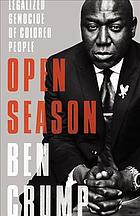
Open Season
Legalized Genocide of Colored People
کتاب های مرتبط
- اطلاعات
- نقد و بررسی
- دیدگاه کاربران
نقد و بررسی

September 1, 2019
An accomplished civil rights attorney and former president of the National Bar Association exposes subtle, systemic genocide in America. Crump assails the criminal justice system in the United States as one designed for white, wealthy men: All others are on their own. "This book," he writes, "featuring many of the cases I have worked on, reveals the systematic legalization of discrimination in the United States, and particularly how it can lead to genocide--the intent to destroy, in whole or in part, a people. This book particularly addresses genocide as it relates to colored people." It's vital, writes the author, to understanding the terms involved as well as how those terms have been manipulated over time. First, the concept of race does not have a biological or genetic basis. It began in the 15th century as Europe sought to justify enslaving, murdering, and stealing the lands of Indigenous people. When left unchecked, racism, the assertion of superiority in order to discriminate, is a tool of genocide. There are also institutional racism and environmental racism, demonstrated in the plight of citizens enduring poisonous water in Flint, Michigan, as well as legal slavery in our prisons, people innocently killed in police custody or on the street under "stand your ground" laws. Crump consistently condemns the courts' failures, demonstrating how policing is unequal and disproportionate; as he notes, people of color are far more likely to go to jail for misdemeanors than white people. The Supreme Court has a long pattern of intellectual justification of discrimination and has relied on the concept of states' rights to throw out cases. Though Jim Crow laws were overturned in the 1960s, new laws quickly replaced them, laws that may be less obvious but still result in voter suppression. Crump rightly warns readers to ignore talk of voter fraud; it's a myth used to justify restrictive laws. Many readers will be justifiably infuriated by the author's well-documented findings; hopefully, they will also choose to follow his 12 "personal action steps" to combat systemic racism. There is much more to inequality and discrimination than we know, and Crump will open your eyes. Pay attention.
COPYRIGHT(2019) Kirkus Reviews, ALL RIGHTS RESERVED.

September 23, 2019
Civil rights attorney Crump, who has represented the families of Trayvon Martin and Michael Brown, delivers a forceful debut exposé of America’s “legalized system of discrimination.” Defining “colored people” as “Black and brown people, and people who are colored by their sexual preference, religious beliefs, or gender,” Crump contends that “what transpires between the United States judicial system and this country’s colored people” is nothing less than genocide—the intentional effort “to destroy, in whole or in part, a people.” As evidence, Crump documents the destructive effects of racial profiling, mass incarceration, stand-your-ground laws, voter disenfranchisement, and disparate educational opportunities afforded to white and minority students. He catalogues high-profile police killings of African-American men, including Michael Brown, and places the 2014 water crisis in Flint, Mich., in the context of the “multigenerational killing” caused by “environmental racism.” He notes, among other statistics, that “more than half of all Americans who live within 1.86 miles of a toxic waste site are Black or brown.” Despite his outrage, Crump believes in the power of the U.S. Constitution to end racial injustice, and offers 12 “personal action steps” readers can take to fight racism. Progressives will welcome Crump’s alarming yet credible account.

October 1, 2019
Award-winning attorney Crump writes a disturbing examination of what he sees as the legal genocide perpetuated by the American judicial system. A Florida-based civil rights lawyer and a legal representative of the family of Trayvon Martin, Crump bases his narrative on a single argument: that the U.S. legal system is designed to disenfranchise people of color since the implementation of certain laws by police and prosecutors tend to favor white people above all. For example, there are several instances of police arresting, shooting, or killing African Americans who own a gun as a means of protecting private property. Some officers faced felonies, but few were convicted and most kept their jobs. Throughout, Crump uses court cases of police misconduct to prove his overall argument. While this is effective in supporting the author's thesis, it is easy to become fatigued by the repeated inability of the courts to recognize injustice perpetrated by police. Also, Crump's argument of legal genocide is occasionally repetitious and might distract general readers. VERDICT Despite a few dense sections, this is overall a critical book in the age of Black Lives Matter, suited for both YA and adult readers. [See Prepub Alert, 3/25/19.]--Leah Huey, Dekalb P.L., IL
Copyright 2019 Library Journal, LLC Used with permission.

October 1, 2019
The president of the National Bar Association and a leading civil rights attorney who recently represented Trayvon Martin's family, Crump draws on cases he has tried nationwide to show that the justice system is rigged to harm people of color. With a 40,000-copy first printing.
Copyright 2017 Library Journal, LLC Used with permission.

























دیدگاه کاربران